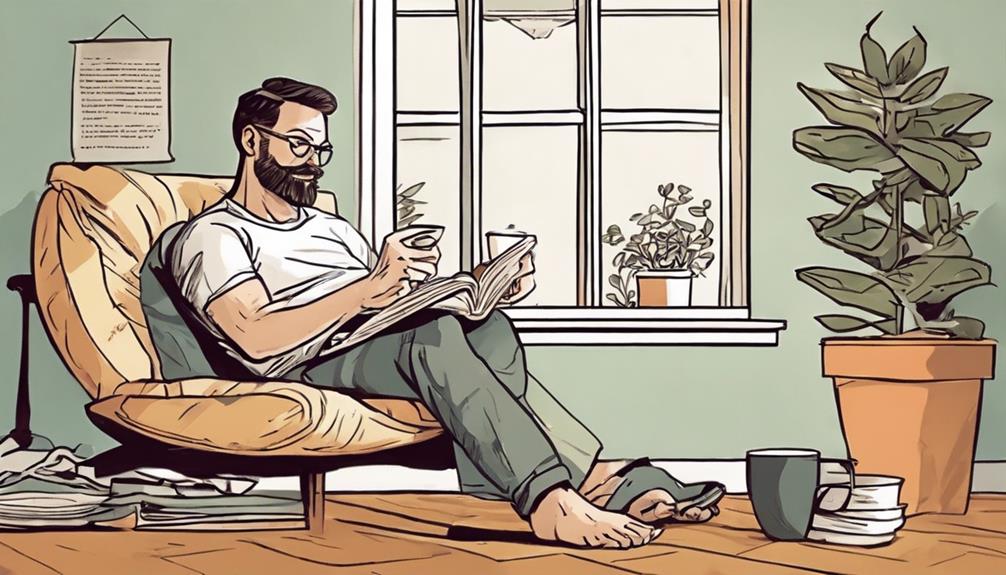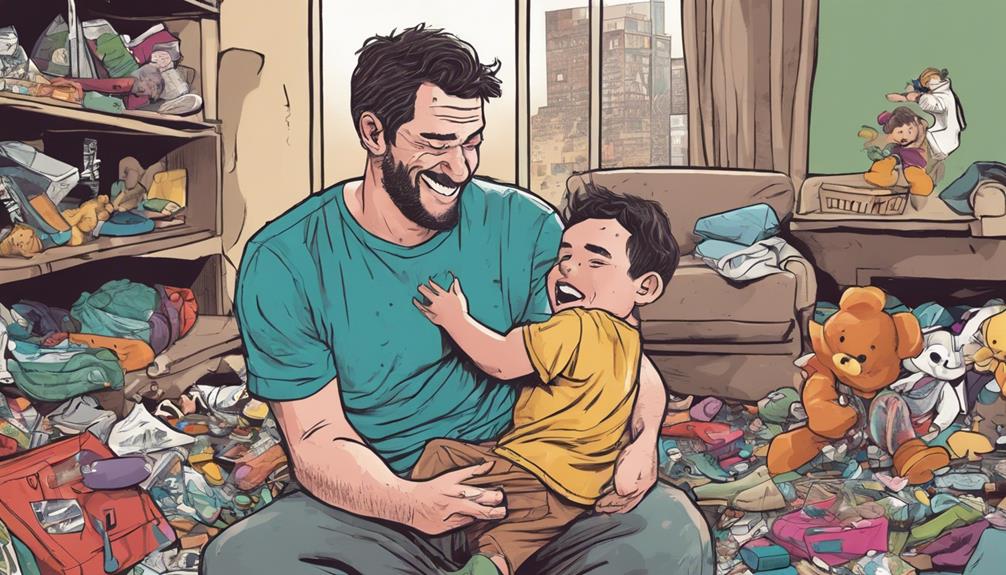Feeling the weight of the world on your shoulders? You’re not alone.
I write to our blog Modern Dads because I’ve been there. Caught in the whirlwind of being a stay-at-home dad, the guilt was real. It wasn’t just about keeping up with societal norms; it was about finding my footing.
With a supportive wife and two kids, Emily, 6, and Liam, 4, the journey wasn’t easy but enlightening.
I found solace in simple things: morning jogs, honest chats with Lisa after the kids slept, and accepting that not every day would be perfect.
But what truly turned the tide was realizing I wasn’t alone. Connecting with other stay-at-home dads through local groups and online forums opened up a world of shared experiences and invaluable advice.
A Day to Remember
One day, Emily came home from school, upset about a classmate saying dads can’t stay home. We sat on the porch, sipping lemonade, as I explained how every family is unique.
That moment of bonding, explaining the value of diversity and love in family roles, underscored the importance of what I do. It was a clear reminder that being there for her and Liam, teaching them about the world and its myriad ways, was my most crucial role.
Key Takeaways
- Building a support system combats stay-at-home dad guilt.
- Prioritizing self-care enhances balance and mental well-being.
- Effective communication with your partner fosters understanding and teamwork.
- Embracing non-traditional parenting roles empowers and celebrates diversity.
Understanding Societal Expectations

If you’re feeling overwhelmed by the societal expectations placed on stay-at-home dads, you’re not alone. Challenging stereotypes and redefining roles can be daunting tasks, especially when faced with the pressure to fit into traditional molds.
Society often assumes that the role of the primary caregiver should fall on mothers, making it challenging for stay-at-home dads to navigate through these preconceived notions.
However, it’s crucial to remember that you aren’t defined by these expectations. By embracing your unique journey and redefining what it means to be a caregiver, you have the power to challenge these stereotypes. Your role as a stay-at-home dad isn’t confined by outdated norms but is an opportunity to create a new narrative that celebrates diversity and inclusion.
Establishing a Support Network
Navigating the challenges of societal expectations as a stay-at-home dad can be less daunting when you establish a strong support network. As you journey through this role, remember that you aren’t alone. Here are some valuable ways to create a support system:
- Online Forums: Engage in online communities specifically tailored for stay-at-home dads. These forums provide a platform for sharing experiences, seeking advice, and finding camaraderie with like-minded individuals.
- Local Meetups: Explore local meetups or playgroups designed for parents. Meeting other stay-at-home dads face-to-face can be incredibly uplifting and can lead to lasting friendships that offer support and understanding.
- Parenting Groups, Friends’ Help: Join parenting groups that host events and discussions. Additionally, don’t hesitate to lean on your friends for support. Whether it’s watching the kids for a few hours or lending a listening ear, friends can be a vital part of your support network.
Building a support network is essential for combating stay-at-home dad guilt and enhancing your parenting journey. Remember, seeking help is a sign of strength, not weakness.
Prioritizing Self-Care Routines

Wondering how you can prioritize self-care routines as a stay-at-home dad amidst your responsibilities and commitments? It’s crucial to remember that taking care of yourself isn’t selfish but essential for maintaining a healthy balance.
When it comes to mental health, carving out time for activities that bring you joy and relaxation can make a significant difference in how you navigate your role. Whether it’s reading a book, going for a walk, or practicing mindfulness, finding moments to recharge can help you better handle the challenges of being a stay-at-home dad.
Effective time management is key to incorporating self-care into your routine. Consider creating a schedule that includes dedicated time for self-care activities. It might require some adjustments, but by prioritizing yourself, you’ll be better equipped to care for your family. Remember, your well-being matters too. By nurturing your mental health and managing your time effectively, you can be a more present and fulfilled stay-at-home dad.
Communicating Openly With Your Partner
To strengthen your bond and maintain a healthy relationship as a stay-at-home dad, opening up honest communication channels with your partner is essential. Open communication and mutual understanding form the foundation of a strong partnership. Here are some tips to help you navigate this aspect of your relationship:
- Schedule Regular Check-Ins: Set aside dedicated time to talk about your feelings, concerns, and joys. This will help both of you stay connected and address any issues promptly.
- Practice Active Listening: Show genuine interest in what your partner has to say. Reflect back on their words to ensure you understand their perspective accurately. This fosters mutual understanding and empathy.
- Share Responsibilities: Clearly define roles and responsibilities within the household. Openly discuss how tasks can be divided to support each other effectively. This shared approach can alleviate stress and build a sense of teamwork.
Embracing Imperfection and Self-Compassion

Embrace your imperfections and practice self-compassion as you navigate the challenges of being a stay-at-home dad. It’s okay to not have everything under control all the time. Practicing mindfulness and self-care can help you be kinder to yourself.
Understand that growth comes from embracing your imperfections, not from striving for unattainable perfection. Allow yourself the grace to make mistakes and learn from them. Remember, you’re doing your best, and that’s always enough.
Self-compassion isn’t a sign of weakness but a strength that allows you to be resilient in the face of difficulties. Treat yourself with the same kindness and understanding that you’d offer a friend in a similar situation. Take time for self-care activities that recharge you, whether it’s reading a book, going for a walk, or simply taking a moment to breathe deeply.
How Can Remote-Working Dads Manage Their Mental Health and Guilt?
Remote-working dads can manage their mental health and guilt by setting boundaries, taking breaks, and seeking support. It’s essential to prioritize self-care, communicate openly with employers and family, and seek professional help if needed. These mental health tips for dads can help alleviate stress and improve overall well-being.
How Can Managing Stay-at-Home Dad Guilt Prevent Burnout?
Managing stay-at-home dad guilt is essential to prevent burnout. By implementing effective strategies for dad burnout, such as setting realistic expectations, finding support from other dads, and taking regular breaks, fathers can avoid feeling overwhelmed and maintain balance in their lives. Open communication with partners is also crucial.
How Can Easing Dad Guilt Also Help with Stress Relief for Stay-at-Home Dads?
Stay-at-home dads often struggle with dad guilt, but easing this burden can also help in managing stress at home. By finding a supportive community, setting realistic expectations, and practicing self-care, stay-at-home dads can alleviate both guilt and stress. Embracing these strategies can lead to a happier and more balanced life.
How Can Stay-at-Home Dads Navigate Career Sacrifices and Guilt?
Stay-at-home dads can struggle with maneuvering career sacrifices and the accompanying guilt. It’s important for them to communicate openly with their partner about their feelings and to seek out a support network. They can also explore flexible work options or part-time opportunities to maintain a connection to the workforce.
How Can Easing Stay-at-Home Dad Stereotypes Help Reduce Guilt?
Navigating stereotypes of stay-at-home dads can help reduce guilt by promoting understanding and acceptance. Challenging preconceived notions allows dads to feel confident in their role and focus on the positives of being an involved parent. Embracing diversity in caregiving can lead to a more supportive and inclusive society.
Conclusion
Being a stay-at-home dad isn’t easy. Society expects a lot, and it’s easy to feel guilty. I’ve found talking with my partner and taking time for myself helps. It’s important to remember, no one’s perfect.
What’s your story with stay-at-home dad guilt?
Drop a comment below. And if you found this helpful, share it on social media to support our blog, Modern Dads.


Leave a Reply